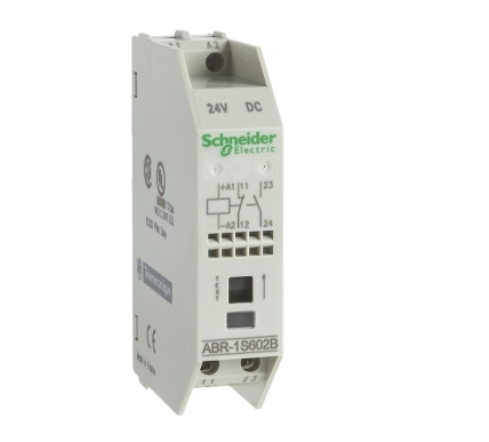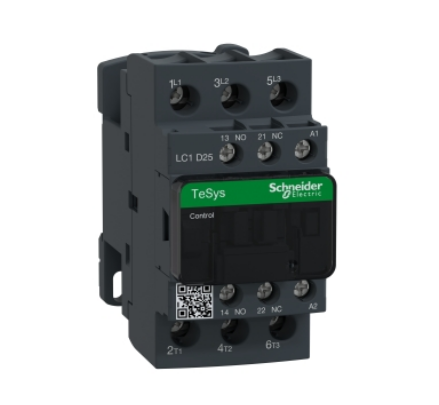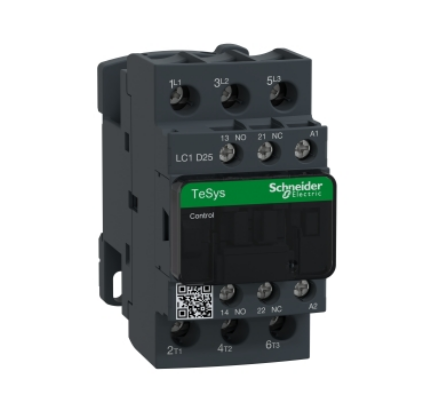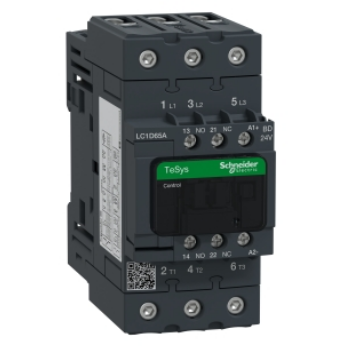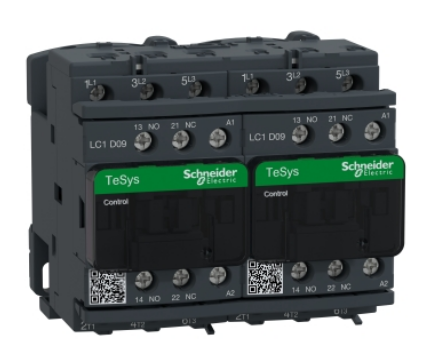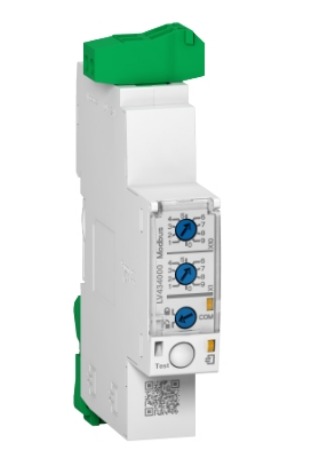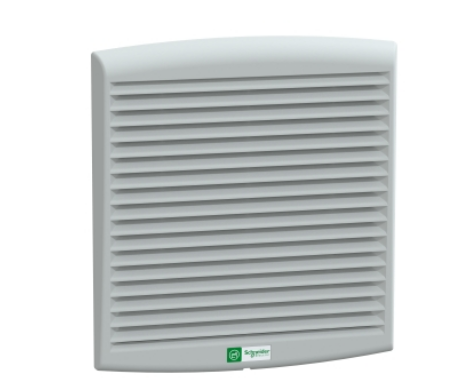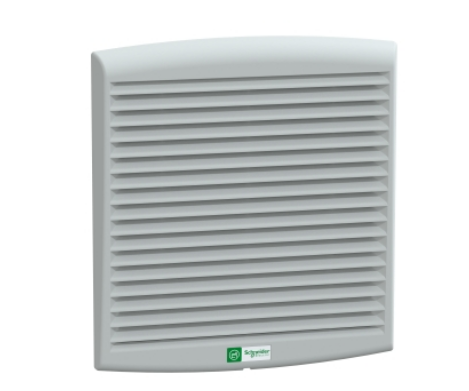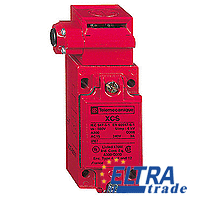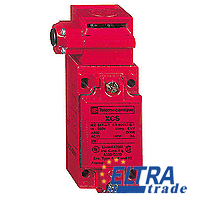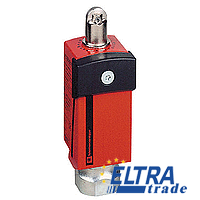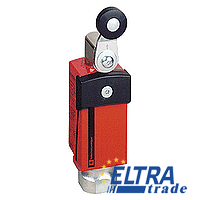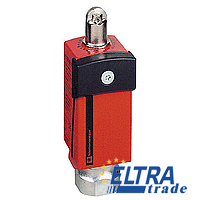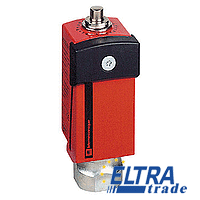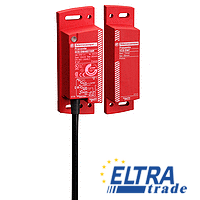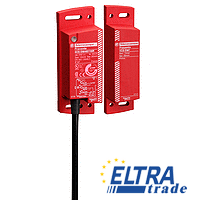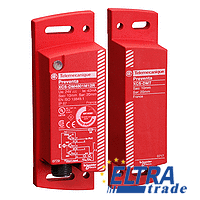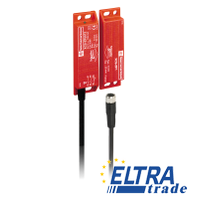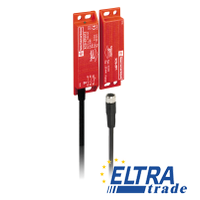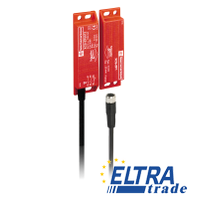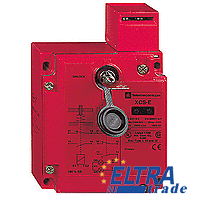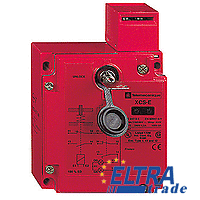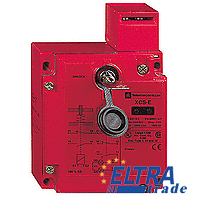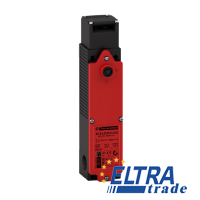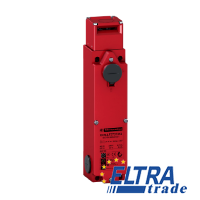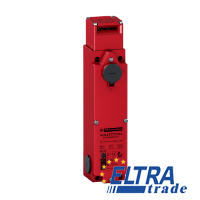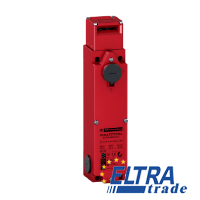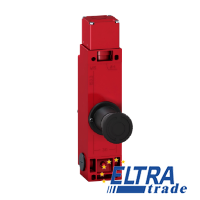Schneider Electric Safety switches
- rated current: 40 A
- Network Frequency: 50/60 Hz
- Weight: 0.37 kg
- Mechanical durability: 20,000 cycles
Dedicated output module for PLC signals
Electromechanical switching and solid state switching
LED indication for control signal state
High performance ensuring machine and system availability
Easy to use
3P - AC-3 440V
25A
24Vac coil
3P(3 NO), AC-3/AC-3e
0 to 440V
25A
250VAC 50/60Hz coil
3P(3 NO), AC-3/AC-3e
0 to 440V
65A
24VDC standard coil
9 A, 3 P, 5 HP at 480 VAC
reversing
120 VAC 50/60 Hz coil
IFM Modbus-SL interface module, Enerlin'X
IP54, 165m3/h
230V
with outlet grille and filter G2
fan 850m3/h
230V - IP54
with grille and G2 filter
| Component name | XCSB |
| Design | Industrial |
| Material | Metal |
| Head type | Key operated turret head |
| Contacts type and composition | 1 NC + 2 NO |
| Component name | XCSB |
| Design | Industrial |
| Material | Metal |
| Head type | Key operated turret head |
| Contacts type and composition | 2 NC + 1 NO |
| Component name | XCSD |
| Design | Compact |
| Material | Metal |
| Head type | Plunger head |
| Protection technology | Plastic protective cover, secured by 5-lobe socket head safety screw |
| Component name | XCSD |
| Design | Compact |
| Material | Metal |
| Head type | Rotary head |
| Protection technology | Plastic protective cover, secured by 5-lobe socket head safety screw |
| Component name | XCSD |
| Design | Compact |
| Material | Metal |
| Head type | Plunger head |
| Protection technology | Plastic protective cover, secured by 5-lobe socket head safety screw |
| Component name | XCSD |
| Design | Compact |
| Material | Metal |
| Head type | Plunger head |
| Protection technology | Plastic protective cover, secured by 5-lobe socket head safety screw |
| Component name | XCSDM4 |
| Design | Rectangular |
| Size | 100 x 34 x 32 mm |
| Contacts type and composition | 1 NO + 1 NO |
| Material | Plastic |
Coded magnetic system XCSDM4
| Component name | XCSDM4 |
| Design | Rectangular |
| Size | 100 x 34 x 32 mm |
| Contacts type and composition | 1 NO + 1 NO |
| Material | Plastic |
- Telemecanique Safety switches XCS
- XCSDMP
- 1 NC + 2 NO
- 1 NO staggered
- 5 m
| Component name | XCSDMP |
| Design | Rectangular, standard |
| Size | 88 x 25 x 13 mm |
| Contacts type and composition | 1 NC + 2 NO |
| Contacts operation | 1 NO staggered |
| Component name | XCSDMP |
| Design | Rectangular, standard |
| Size | 88 x 25 x 13 mm |
| Contacts type and composition | 2 NC + 1 NO |
| Contacts operation | 1 NC staggered |
| Component name | XCSDMP |
| Design | Rectangular, standard |
| Size | 88 x 25 x 13 mm |
| Contacts type and composition | 2 NC + 1 NO |
| Contacts operation | 1 NC staggered |
| Component name | XCSE |
| Design | Rectangular |
| Material | Metal |
| Head type | Key operated turret head |
| Contacts type and composition | 1 NC + 2 NO |
| Component name | XCSE |
| Design | Rectangular |
| Material | Metal |
| Head type | Key operated turret head |
| Contacts type and composition | 2 NC + 1 NO |
| Component name | XCSE |
| Design | Rectangular |
| Material | Metal |
| Head type | Key operated turret head |
| Contacts type and composition | 3 NC |
| Component name | XCSLF |
| Design | Slim |
| Material | Metal |
| Head type | Key operated turret head |
| Contacts type and composition | 1 NC + 2 NO |
| Component name | XCSLF |
| Design | Slim |
| Material | Metal |
| Head type | Key operated turret head |
| Contacts type and composition | 1 NC + 2 NO |
| Component name | XCSLF |
| Design | Slim |
| Material | Metal |
| Head type | Key operated turret head |
| Contacts type and composition | 2 NC + 1 NO |
| Component name | XCSLF |
| Design | Slim |
| Material | Metal |
| Head type | Key operated turret head |
| Contacts type and composition | 2 NC + 1 NO |
Schneider Electric is one of the most popular electronics manufacturers in the world. In particular, the company offers a wide range of safety switches designed to protect and isolate electrical circuits. Below we take a closer look at Schneider Electric safety switches.
Types of Schneider Safety Switches
Here are the most popular types of equipment from the Schneider Electric safety switch catalog.
- Safety switches without fuses. These switches allow you to turn off power to a circuit or equipment. They do not have built-in fuses and are mainly used for circuit isolation and maintenance.
- Safety switches with fuse. Fused safety switches combine the function of a disconnector with a fuse. They provide overload and short circuit protection with fuses that can be replaced when they blow. Fused safety switches are available in a variety of current ratings and fuse types for a variety of applications.
- Heavy-duty safety switches. These switches are designed for industrial and commercial applications where higher voltage and current ratings are required. They are designed to work in difficult conditions and are characterized by increased strength and reliability.
- Enclosed safety switches. Enclosed safety switches Schneider is housed in a protective housing that provides additional protection against dust, moisture, and accidental contact with live parts. They are usually used outdoors or in places where there is a higher risk of exposure to environmental elements.
- Rotary switch-disconnectors. Rotary switch disconnectors allow manual control of the power source by turning a knob or lever to turn the switch on or off. They are often used in applications where a fast and visible method of power isolation is required.
- Circuit-Lock Safety Switches. Circuit-Lock safety switches are designed to provide secure interlocking and prevent unauthorized access to electrical equipment. They include mechanical and electrical interlocks that ensure the switch cannot operate unless the circuit is de-energized.
Emergency Stop Switches
Emergency stop switches are important devices that meet all safety requirements and are used to quickly and effectively shut down equipment or machinery in an emergency. Several types of emergency switches are available.
- Emergency stop pushbuttons. These switches have a large red mushroom button that is easily accessible and visible. When pressed, it immediately cuts off power to the equipment, activating the emergency stop sequence.
- Lanyard emergency stop switches. Pull cord switches consist of a cord or rope that is usually located along the entire length of the conveyor or near hazardous areas. By pulling on the cord, the switch is activated, stopping the equipment and preventing further movement or operation.
- Rope emergency stop switches. These switches are similar to rope switches, but they use a longer rope that can be pulled over a larger area. When the rope is pulled or pulled, it will activate the switch, causing an emergency stop.
- Emergency stop switches that can be released by turning. These switches require the operator to turn and release the mushroom button to reset the switch after an emergency stop. This prevents accidental restarts and provides a deliberate reset.
- Emergency stop pushbuttons. Pushbutton switches are designed to be activated by pressing the palm of your hand. They provide quick and easy access for operators to initiate an emergency stop with the simple push of a button.
- Emergency stop foot switches. Foot pedal switches are controlled by the operator's foot, allowing hands-free operation. They are typically used in applications where the operator needs to have their hands free for other tasks while still being able to activate an emergency stop.
Limit Switches
Safety limit switches Schneider Electric are commonly used in industrial automation, machine tools, handling equipment, and other applications where reliable position detection is required.
- Compact limit switches. These limit switches are designed for applications with limited space. They are compact in size yet provide reliable performance and durability.
- Metal limit switches. These circuit breakers are designed to operate in harsh environments and are highly resistant to mechanical stress, vibration, and shock.
- Plastic limit switches. Limit switches of this type are lighter in weight and more economical than metal switches. They are suitable for applications where environmental conditions are less demanding.
- Rotary limit switches. These switches are designed to detect the rotation or movement of a shaft or an object. They are usually equipped with a rotary actuator that actuates the switch when it reaches a certain angle or position.
- Safety limit switches. Similar limit switches are specially designed for the safety of personnel and equipment. These switches often have additional features such as positive opening contacts and increased mechanical strength.
- Wireless limit switches. These limit switches use wireless technology to transmit signals without the need for physical wiring. They provide installation flexibility and can be easily integrated into existing systems.
Features and Benefits of Schneider Safety Switches
Schneider Electric disconnect switches offer a range of features and benefits that contribute to the protection and reliable operation of electrical circuits and equipment.
- Reliable electrical isolation. Safety switches allow you to cut off power to a circuit or equipment, providing reliable electrical isolation for maintenance, repair, or emergency situations.
- Rugged construction. Schneider safety switches are made from high-quality materials and are designed to work in harsh environments.
- Wide range of voltage and current ratings. Schneider Electric offers circuit breakers in a variety of voltage ratings and current ratings, giving you the flexibility to choose the right circuit breaker for your specific application, whether residential, commercial, or industrial.
- Several configurations and options. This equipment comes in a variety of configurations to suit a variety of installation requirements.
- Improved security features. Schneider Electric incorporates safety features into its circuit breakers to ensure reliable operation. These features may include positive contact openings, mechanical interlocks, interlock capabilities, and visible switch position indicators.
- Compliance. Schneider Electric safety switches are designed in accordance with applicable international safety standards and regulations, ensuring they meet stringent safety and reliability requirements.
- Easy to install and maintain. Schneider safety switches are easy to install and maintain. They often feature user-friendly designs, clear markings, and accessible terminals to facilitate efficient setup and troubleshooting.
- Integration with the Schneider Electric ecosystem. Schneider Electric safety switches can be integrated with other Schneider Electric products and systems for full compatibility and enhanced control and monitoring capabilities.
- Global availability and support. Schneider Electric is a globally recognized brand with a wide distribution network and excellent customer support. This ensures that their safety switches are available worldwide and have access to technical assistance when needed.
Applications of Schneider Safety Switches
Schneider safety switches are used in a variety of industries and environments where the protection, isolation, and safety of electrical circuits are critical. Here are some common applications for Schneider safety switches:
- Industrial equipment.
- Commercial buildings.
- HVAC systems.
- Renewable energy systems.
- Water and wastewater treatment.
- Oil and gas industry.
- Food and beverage industry.
- Infrastructure and utilities.
Factors to Consider when Choosing Schneider Safety Switches
When you are a Schneider safety switch selector you need to consider several important factors to ensure they meet your specific requirements. Here are some key factors to consider when choosing Schneider safety switches:
- Rated values of current and voltage.
- Protection type.
- Environmental conditions.
- Mounting method.
- Security features.
- Possibility of integration.
- Availability and support.
The main Schneider Safety Switch Products:
- Key operated switches
- Switches with solenoid
- Rotary lever switches
- Limit switches
- Coded magnetic systems
- Coded magnetic switches

